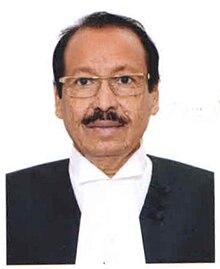
The Supreme Court of Bangladesh is the highest court of law in Bangladesh. It is composed of the High Court Division and the Appellate Division, and was created by Part VI Chapter I of the Constitution of Bangladesh adopted in 1972. This is also the office of the Chief Justice, Appellate Division Justices, and High Court Division Justices of Bangladesh. As of August 2023, there are 7 Justices in Appellate Division and 89 Justices in High Court Division.

The International Crimes Tribunal (Bangladesh) (ICT of Bangladesh) is a domestic war crimes tribunal in Bangladesh set up in 2009 to investigate and prosecute suspects for the genocide committed in 1971 by the Pakistan Army and their local collaborators, Razakars, Al-Badr and Al-Shams during the Bangladesh Liberation War. During the 2008 general election, the Awami League (AL) pledged to try war criminals. The government set up the tribunal after the Awami League won the general election in December 2008 with a more than two-thirds majority in parliament.
Mohammed Nizamul Huq Nassim, was a judge of the High Court Division of the Supreme Court of Bangladesh. He is the incumbent Chairman of Bangladesh Press Council. He chaired the panel of three judges that presided over the Bangladesh International Crimes Tribunal until his resignation on 11 December 2012.

Abdul Quader Mollah was a Bangladeshi Islamist leader, writer, and politician of the Bangladesh Jamaat-e-Islami, who was convicted of war crimes and sentenced to death by the International Crimes Tribunal, Bangladesh (ICT) set up by the government of Bangladesh and hanged. There were objections from the United Nations, the governments of several countries, including Turkey, and international human rights organizations but there was widespread support from the general public of Bangladesh for the execution.
The 2012 ICT Skype controversy was the leaking of Skype conversations and emails between Mohammed Nizamul Huq, head judge and chairman of Bangladesh's International Crimes Tribunal, and Ahmed Ziauddin, a Bangladeshi lawyer based in Brussels. These conversations took place during the prosecution of the accused for alleged war crimes during the Bangladesh Liberation War in 1971.
Md. Muzammel Hossain is a Bangladeshi jurist who served as the 20th Chief Justice of Bangladesh.
Anwarul Haque was a Bangladesh Supreme Court justice who served as the Chairman of International Crimes Tribunal-1.
Mamnoon Rahman is a Bangladeshi justice of the High Court Division of Bangladesh Supreme Court. He was appointed in 2004.
Md. Shahinur Islam is a Bangladeshi justice of the High Court Division and International Crimes Tribunal.
Kazi Md. Ejarul Haque Akondo is a Bangladeshi justice of the High Court Division. He was appointed in 2012.
Jahangir Hossain a judge of the Appellate Division of Bangladesh Supreme Court..
Obaidul Hassan is a judge on the Appellate Division of Bangladesh Supreme Court.
M Enayetur Rahim is a justice on the Appellate Division of Bangladesh Supreme Court. Earlier, he was justice of the High Court Division, Bangladesh Supreme Court. He also served as the chairman of the International Crimes Tribunal 1.
Md. Shohrowardi is a Justice of the High Court Division of Bangladesh Supreme Court.
Md. Nazrul Islam Talukder is a judge of the High Court Division of Bangladesh Supreme Court. He is a member of Bangladesh Judicial Service Commission.
Sheikh Hassan Arif is a judge of the High Court Division of Bangladesh Supreme Court.
Md. Moinul Islam Chowdhury is a Judge of the High Court Division of Bangladesh Supreme Court.
Abu Taher Md. Saifur Rahman is a Judge of the High Court Division of Bangladesh Supreme Court.
Md. Mozibur Rahman Miah is a Justice of the High Court Division of the Bangladesh Supreme Court. He was a judge of the International Crimes Tribunal-2, war crimes court for crimes committed during Bangladesh Liberation War.
Md. Abu Ahmed Jamadar is a Justice of the High Court Division of the Bangladesh Supreme Court. He is a judge of the International Crimes Tribunal.



